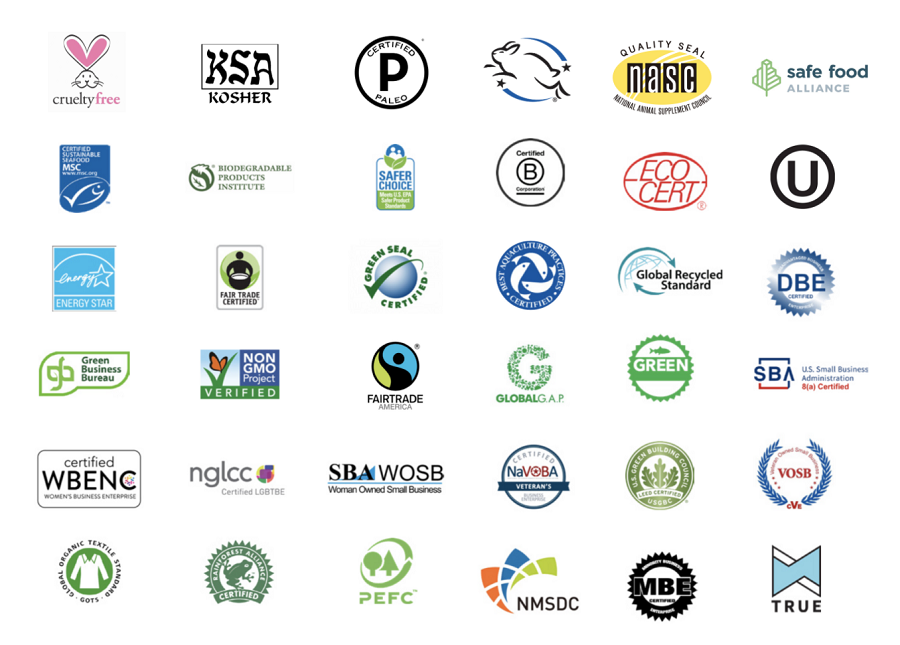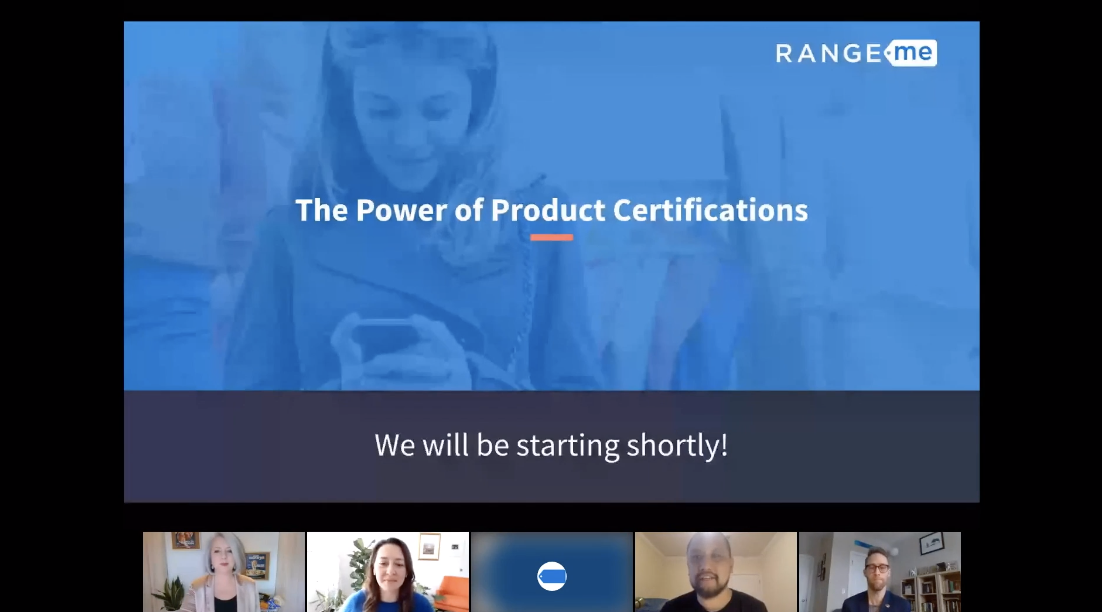The Power of Certifications: 5 Key Takeaways for Brands 2/15/2021
 To certify, or not to certify. That is the question most suppliers face at some point on their brand’s journey. One of the key ways suppliers set themselves apart is through brand and product certifications. As consumers demand more products that align with their values, whether it’s non-GMO or minority-owned brands, retail buyers are listening and actively searching for these certifications to find products for their stores.
To certify, or not to certify. That is the question most suppliers face at some point on their brand’s journey. One of the key ways suppliers set themselves apart is through brand and product certifications. As consumers demand more products that align with their values, whether it’s non-GMO or minority-owned brands, retail buyers are listening and actively searching for these certifications to find products for their stores.
Earlier this month, RangeMe hosted a live webinar “Leveraging the Power of Product Certifications to Connect with Buyers,” featuring buyers and CPG experts who shared insights into what it means for your brand to carry industry-recognized certifications and why it matters to both retailers and consumers alike. Below we’re summarizing some of the key takeaways that Kenny Haussman, Sr. Category Manager at Fresh Thyme Market, Kate Weaver, Supplier Diversity Manager for Peapod Digital Labs, an Ahold Delhaize USA company, and Alli Ball, Creator of Retail Ready and host of the Food Biz Wiz podcast had to share during the hour discussion.
1. Certification types
Suppliers can achieve certifications at the brand/company level and the product level. Brand-level certification means your brand carries certifications that embody your brand’s operations, mission, and achievements. Some of these certifications include Certified B Corporation, Women’s Business Enterprise, Veteran-Owned, etc. Product-level certifications are the certification you achieve for individual products such as Certified Vegan, Non-GMO Project Verified, Fair Trade, Kosher, or Rainforest Alliance.
2. Certifications give consumers the power to choose
As for the importance of certifications to your brand, getting certified is a way to set your brand apart from other suppliers in the retail industry. And as consumers’ shopping behaviors change and they become more aware of what these certifications mean, they search for products with familiar labels and icons. Approximately 95% of Americans are aware of one or more certifications, and 85% of consumers trust dependent third-party certification organizations to verify product claims. Not to mention, 78% of consumers said they are willing to pay a premium for a product with a certification because they know it’s something they can trust.
“Conscious consumerism is at an all-time high. Consumers want to shop their values and certifications help them do this.” – Kate Weaver, Supplier Diversity Manager for Peapod Digital Labs, an Ahold Delhaize USA company.
3. Retailers care too
Just like consumers, retailers care about product certifications, too. Why? Because they want to align with their consumer’s values and provide them with the products that support these values.
Through several conversations with buyers from retailers like Beauty Matter, Thrive Market, and Fresh Thyme, certifications have been a recurring theme as an important part of their product discovery process.
Back in 2019, Hausmann shared in a spotlight interview, “supplier qualities that spark our interest include certain certifications such as a Women-Owned Business or Certified B Corporation, marketing plan, and if they are enthusiastic about working with us.” For Hausmann and other Fresh Thyme buyers, certifications are still just as important now, if not more, than they were back then. Hausmann further explained in the webinar, “certifications help retailers, like Fresh Thyme, find products and create a tailored assortment for our customers, and help us differentiate our offerings from the competition.”
And for retailers like Fresh Thyme, who have a commitment to bringing in products of a certain standard, will use RangeMe to source brands that meet those standards. For example, through the thousands of product submissions, Hausmann and his team get every day, if they’re actively looking for products that are non-GMO, they will set that filter to only review brands with non-GMO certifications to help them narrow their search.
4. Certifications are another tool in your marketing toolbox
If your brand has a certification, that’s great! It’s something you should be proud of, but it’s also not something you should lead with, especially when pitching to retail buyers.
Hausmann shared some great insights from the buyer perspective; “It’s really about the product, the brand’s promise, and what it stands for, and certifications really help reinforce that. But first, fundamentally, the product needs to align with consumer demand and the market before looking at certifications, and certifications helps cement that.”

Both Weaver and Ball shared some perfect examples of ways to leverage your certification as another marketing tool. Some examples included including your certifications in your email signature, presentation decks, sell sheets, and even on your social media pages.
And with the growth of ecommerce in 2020, certifications are another way to communicate your brand and product values through displaying a recognizable mark or logo that consumers, when comparing products online, can easily make a purchasing decision.
5. Is the cost worth it?
The most frequently asked question about certifications is “are certifications worth the price?” It’s not cheap to get your brand or products certified, especially for an emerging brand in the CPG industry. It can be difficult to decide if this is the best route for your business, or when the right time to get a certification is.
The answer to this question simply put, as Ball shares in the webinar, is “it comes back to your business goals and your target audience. From an end consumer and a retailer perspective.” For example, if you sell a sparkling water and it’s vegan, there’s most likely no reason to spend money on a vegan certified certification. However, if you’re selling a sparkling water with biodegradable packaging, it is a better decision to get Biodegradable Products Institute (BPI) certified.
If you know a certain product or brand certification can add value to your business and help you spark the interest of both retailers and consumers, and it’s within your budget, go for it!
To learn more about Leveraging the Power of Product Certifications to Connect with Buyers, watch the full webinar here.
Want to get exclusive access to upcoming webinars with industry recognized certification providers? Sign up for RangeMe here.
If you’re already a supplier on RangeMe, explore trusted certification providers in RangeMe Services here.
ECRM's recent interview with Kate LaBross covered many of the certifications that are prevalent in the natural products space. You can check out the post here.


Isabel is the Content Marketing Manager at RangeMe. She is curious about the humans behind the brands on RangeMe and what inspires them to grow their business. Isabel is also the first of her name, gluten intolerant, destroyer of chocolate, recycler of plastic, and mother of content.